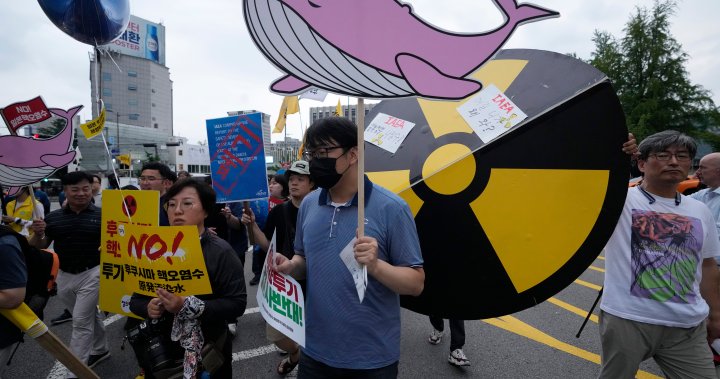A proposal to dispose of treated wastewater from the Fukushima nuclear power plant in Japan by dumping it into the ocean has faced significant backlash. While some argue that there is no danger in doing so, concerns persist. The Fukushima plant, which suffered a meltdown in 2011, is moving forward with its plan to release used water into the Pacific Ocean. This water, used to cool the reactor cores, has been stored in tanks at the plant for the past decade. These tanks are expected to reach capacity by early 2024.
Japanese officials argue that releasing the water is necessary to prevent accidental leaks in case of another disaster and to facilitate the plant’s decommissioning. They plan to release the water gradually over several decades through an undersea tunnel. Despite this, there are concerns about the water’s potential contamination due to the abnormal circumstances surrounding the meltdown. Specifically, the presence of the isotope tritium, which is difficult to remove from water, has raised alarm.
However, experts claim that the water is now safe due to extensive filtration processes. Jason Donev, an associate professor of physics at the University of Calgary, explains that the water has undergone decay in the tanks, releasing much of its radioactivity. Additionally, it will go through a thorough filtration process called the Advanced Liquid Processing System (ALPS), which is highly effective. Donev reassures that the amount of radiation remaining in the water is well below levels that would cause harm.
Nonetheless, concerns about the long-term impacts of low radiation exposure on marine life remain. Fishing communities in the area fear potential safety risks and damage to their reputation. The decision to discharge the wastewater has also attracted international attention, with countries like South Korea closely monitoring the situation and demanding accountability. Protests have taken place in various locations, urging Japan to reconsider its plan.
The Japanese government defends its decision and asserts that the International Atomic Energy Agency’s report supports the safety of the wastewater release. However, critics accuse Japan of pressuring the agency to produce favorable results. In response, South Korean lawmakers and activists have called for an apology and the immediate withdrawal of the disposal plan.
Economy and Industry Minister Yasutoshi Nishimura recently visited the Fukushima Daiichi nuclear plant to inspect key equipment following the regulatory authority’s permit for the release. The government maintains that the environmental impact will be negligible.
Overall, the debate surrounding the disposal of treated wastewater from the Fukushima nuclear power plant raises concerns about potential contamination and the long-term effects on marine life. It also highlights the need for transparency, accountability, and international collaboration to ensure the safe handling of nuclear waste.
Denial of responsibility! VigourTimes is an automatic aggregator of Global media. In each content, the hyperlink to the primary source is specified. All trademarks belong to their rightful owners, and all materials to their authors. For any complaint, please reach us at – [email protected]. We will take necessary action within 24 hours.


